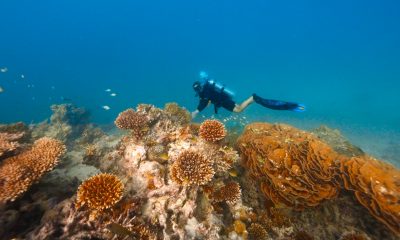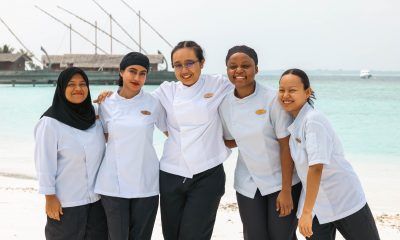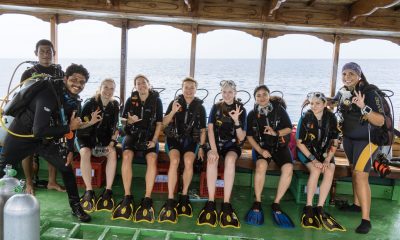Featured
Coronavirus will cost global tourism at least $1.2 trillion, UN agency warns

The world’s tourism sector could lose at least $1.2 trillion, or 1.5 per cent of the global gross domestic product (GDP), having been placed at a standstill for nearly four months due to the coronavirus pandemic, according to a report Wednesday from the United Nations Conference on Trade and Development.
The UNCTAD warned that the loss could rise to $2.2 trillion or 2.8 per cent of the world’s GDP if the break in international tourism lasts for eight months, in line with the expected decline in tourism as projected by the UN World Tourism Organisation (UNWTO).
UNCTAD estimates losses in the most pessimistic scenario, a 12-month break in international tourism, at $3.3 trillion or 4.2 per cent of global GDP.
Tourism is a backbone of many countries’ economies and a lifeline for millions of people around the world, having more than tripled in value from $490 billion to $1.6 trillion in the last 20 years, according to UNWTO.
But Covid-19 has brought it to a halt, causing severe economic consequences globally.
Prevailing lockdown measures in some countries, travel restrictions, reductions in consumers’ disposable income and low confidence levels could significantly slow down the sector’s recovery.
Even as tourism slowly restarts in an increasing number of countries, it remains at a standstill in many nations.
“These numbers are a clear reminder of something we often seem to forget: the economic importance of the sector and its role as a lifeline for millions of people all around the world,” UNCTAD’s director of international trade Pamela Coke-Hamilton was quoted in a statement, as saying.
“For many countries, like the small island developing states, a collapse in tourism means a collapse in their development prospects. This is not something we can afford.”
Developing countries could suffer the steepest GDP losses.
Jamaica and Thailand stand out, losing 11 per cent and 9 per cent of GDP respectively in the most optimistic scenario of UNCTAD’s estimates. Other tourism hotspots such as Kenya, Egypt and Malaysia could lose over three per cent of their GDP.
But the tourism sector in many rich nations will also feel the squeeze.
Popular European and North American destinations, including France, Greece, Italy, Portugal, Spain and the United States could lose billions of dollars due to the dramatic drop in international tourism, according to UNCTAD forecasts.

Impact on other sectors, jobs and wages
Travel and tourism account for a significant share of global GDP and more than half of many countries’ national income.
Coronavirus-induced losses in tourism have a knock-on effect on other economic sectors that supply the goods and services travellers seek while on vacation, such as food, beverages and entertainment.
UNCTAD estimates that for every $1 million lost in international tourism revenue, a country’s national income could decline by $2 million to $3 million.
The massive fall in tourist arrivals has also left a growing number of skilled and unskilled workers unemployed or with less income.
UNCTAD estimates show that in the worst-affected countries, such as Thailand, Jamaica and Croatia, employment for unskilled workers could decrease at double-digit rates even in the most moderate scenario.
In the case of wages for skilled workers, the steepest drops could be seen in Thailand (-12 per cent), Jamaica (-11 per cent) and Croatia (-nine per cent), in the optimistic case, doubling or tripling in the worst scenario.
The effects could be particularly negative for women, who are expected to be disproportionately affected by layoffs in tourism due to Covid-19, according to the report.
Women are more likely than men to be entrepreneurs in tourism and make up about 54 per cent of the workers in the accommodation and food services sectors.
And because many women in the sector work informally in low-skilled jobs, they are less likely to have unemployment benefits or other safety nets.
“This is why women are particularly hard hit in this crisis. And this is why policies that help protect the sector also protect the economic empowerment that many of these women have long fought for,” Coke-Hamilton said.


Maldives continues to suffer
The UNCTAD report shows that inbound tourism accounts for 58 per cent of the Maldives GDP.
The report, however, does not specify the impact of Covid-19 on Maldives tourism and its economy.
The coronavirus outbreak has hit the Maldivian economy hard, as travel restrictions and other preventive measures affect the country’s lucrative tourism industry, which contributes the bulk of the island nation’s state revenue and foreign reserves.
Before the pandemic, the government had been bullish about tourism prospects, targeting two million, high-spending holidaymakers this year after last year’s record 1.7 million.
However, only 382,760 tourists visited the Maldives before the country closed its borders on March 27. It was a 40.8 per cent decline over the 646,092 that visited the Maldives from January to March last year.
With arrival numbers falling, several resorts across the Maldives suspended operations.
Tourism has been the bedrock of the Maldives’ economic success. The $5 billion-dollar economy grew by 6.7 per cent in 2018 with tourism generating 60 per cent of foreign income.
However, the government is at present projecting a possible 13 per cent economic contraction this year — an estimated $778 million hit.
On March 8, Maldives reported its first cases of the novel coronavirus, as two hotel employees tested positive for Covid-19 at a luxury resort in the archipelago.
Eighteen more cases — all foreigners working or staying resorts and liveaboard vessels except five Maldivians who had returned from abroad — were later identified.
A six-case cluster of locals, detected in capital Male on April 15, confirmed community transmission of the coronavirus. Several more clusters have since been identified, bringing the total number of confirmed case in the Maldives to 2,382.
Ten deaths have been reported and 1,954 have made full recoveries.
The Maldives announced a state of public health emergency on March 12, the first such declaration under a recent public health protection law.
The public health emergency declaration allowed the government to introduce a series of unprecedented restrictive and social distancing measures, including stay-at-home orders in capital Male and its suburbs, a ban on inter-island transport and public gatherings across the country, and a nationwide closing of government offices, schools, colleges and universities.
Non-essential services and public places in the capital such as gyms, cinemas and parks were also shut.
Restaurants and cafes in the capital were asked to stop dine-in service and switch to takeaway and delivery.
A nationwide shutdown of all guesthouses, city hotels and spa facilities located on inhabited islands was also ordered.
These measures allowed authorities to contain the outbreak.
The restrictions are now being eased in phases, with the third phase kicking in from Wednesday.
The Maldives is also preparing to reopen its borders on July 15.
Recovery support needed
UNCTAD calls for strengthened social protection in the affected nations to prevent the worst economic hardship for people and communities that depend on tourism.
It urges governments to protect workers. Where some enterprises are unlikely to recover, wage subsidies should be designed to help workers move to new industries.
Governments should also assist tourism enterprises facing the risk of bankruptcy, such as hotels and airlines. One approach for financial relief is low-interest loans or grants, the report states.
In addition, UNCTAD calls on the international community to support access to funding for the hardest-hit countries.
Cover photo: Mihaaru News
Cooking
Patina Maldives hosts Chef Shannon Bennett for exclusive April residency

From 1 to 5 April 2026, Patina Maldives, Fari Islands will host Shannon Bennett, one of Australia’s most recognised culinary figures and the creative force behind Belongil. The residency brings together a chef known for shaping dining as an emotional and reflective experience with a destination defined by perspective, creativity and purpose.
Bennett’s career extends beyond traditional notions of cooking. Through projects such as Vue de Monde and Belongil, he has explored dining as a medium for memory, connection and emotion, placing emphasis on experience rather than consumption. His approach centres on creating moments that remain with guests long after the meal has ended.
At Patina Maldives, the residency represents a convergence of shared values. Over five nights, guests are invited to take part in a limited series of dining experiences shaped by intention, curiosity and a sense of place. Rather than recreating Belongil in another setting, the programme evolves its philosophy, drawing inspiration from the natural rhythm and clarity of the Maldivian environment.
Commenting on the collaboration, Bennett said Belongil was conceived as more than a place to eat, but as a space for ideas, connection and lasting moments. He noted that Patina Maldives reflects a similar sense of purpose, adding that bringing his work into the island setting offered an opportunity to create experiences that feel grounded, honest and meaningful.
Patina Maldives continues to develop its identity by providing a platform for global creative voices to shape new conversations and perspectives. The residency with Bennett aligns with this approach, positioning cuisine as one element within a broader cultural and experiential narrative.
Tom Bray, Director of Lifestyle at Patina Maldives, said the resort exists to bring people closer to ideas, creativity and self-discovery. He added that welcoming Bennett reflects this philosophy, describing the residency as an experience designed to shift perspective rather than focus solely on gastronomy.
The residency is presented as an experience defined by intention rather than spectacle. Taking place over five nights on a single island, it brings together Patina Maldives and one of the culinary world’s most reflective minds for a programme shaped by presence, purpose and a sense of moment that cannot be replicated in the same way again.
Featured
You & Me Maldives unveils curated Premium All Inclusive programme

You & Me Maldives, the adults-only luxury retreat under The Cocoon Collection, has announced the launch of its new Premium All Inclusive experience, aimed at enhancing island stays through a more seamless and comprehensive offering in the Indian Ocean.
The Premium All Inclusive experience is designed to begin from the point of arrival. Guests receive complimentary access to The Cocoon Collection Lounge at the seaplane terminal at Velana International Airport, where services are provided to ensure a smooth transition before the journey to the resort.
On arrival at the island, guests are welcomed in their villas with a chilled bottle of sparkling wine and a selection of canapés. The Premium All Inclusive plan includes unlimited premium beverages by the glass, featuring a curated range of wines, signature cocktails, top-shelf spirits, international beers and non-alcoholic options. The in-villa minibar is replenished daily with soft drinks, international beers, red and white wines, as well as assorted snacks. For stays of five nights or more, guests also receive two bottles of premium liquor from a selected list, provided once during the stay.
The experience further includes a range of activities. Guests staying a minimum of three nights are offered one sunset cruise and one snorkelling excursion per stay, while those staying seven nights or more are entitled to a catamaran cruise. Unlimited use of snorkelling equipment and non-motorised water sports, including canoeing, kayaking and paddle boarding, is also included, subject to weather conditions.
Dining forms a central part of the Premium All Inclusive concept. Guests can enjoy three themed dining evenings, including a seafood barbecue under the stars featuring prawns, lobster and oysters. For stays of five nights or more, guests may also take part in a complimentary group cooking class, with a choice between ethnic or Italian cuisine, led by the resort’s culinary team.
Wellness offerings are also incorporated into the programme, with guests able to participate in up to three complimentary sunrise yoga sessions per stay, subject to availability.
The introduction of the Premium All Inclusive experience reflects the resort’s focus on personalised service and carefully curated stays. The offering is positioned to appeal to couples seeking relaxation, romance or activity-led experiences within an adults-only island setting.
Featured
Eid celebrations at SO/ Maldives blend Arabic tradition and Maldivian culture

SO/ Maldives is inviting global travellers this season to reimagine Eid not merely as a holiday, but as an immersive island escape. Located just 15 minutes by speedboat from Malé, the fashion-forward private island retreat sets the stage for a celebration where cultural heritage, contemporary luxury and tropical glamour come together.
At the centre of the festivities is an authentic culinary experience at Hadaba, the resort’s award-winning Arabic restaurant. Guests are offered Levantine flavours, artisanal mezze and traditional recipes presented with a modern approach, creating a setting for shared dining and celebration. As part of the resort’s dine-around concept, Hadaba can be included in a wider culinary journey across the island, allowing guests to experience Arabic cuisine alongside the resort’s other dining venues.
As evening falls, celebrations move to Lazuli Beach Club, where shisha rituals and Arabic-inspired refreshments are served in a beachfront setting. Traditional performances are complemented by Maldivian Boduberu drumming and fire dance displays, creating a cultural programme designed to appeal to international travellers seeking meaningful experiences.
Across the island, Eid is marked through a series of curated activities aimed at encouraging connection and creativity. Cultural workshops, including palm-leaf artistry and henna sessions, offer opportunities to explore heritage, while younger guests are engaged through themed crafts, interactive games and sweet treat decorating. The overall atmosphere remains celebratory while maintaining a relaxed pace that reflects the resort’s character.
Beyond the festive programme, the resort positions the long weekend as a fully immersive island retreat. Guests stay in beach and overwater villas featuring private pools and ocean views, with interiors inspired by high fashion. Time is spent between spa treatments, lagoon activities, beach club experiences and sunset dining, balancing celebration with seclusion.
To mark the season, the resort has introduced two limited-time stay offers. The One Night on Us offer provides savings of 33 per cent on stays of three nights or more, along with daily breakfast, complimentary transfers and spa privileges. The Soo Summer package offers preferential rates combined with spa experiences, curated dining inclusions and additional benefits for water villa stays.
Welcoming travellers from Europe, Asia, the Middle East and beyond, the resort presents Eid as a global celebration where Arabic traditions, Maldivian culture and contemporary design are brought together. This season, guests are invited to exchange routine for island surroundings and experience Eid through a redefined island perspective.
-

 News1 week ago
News1 week agoVentive Hospitality aligns Maldives portfolio with Green Fins marine sustainability platform
-

 Business1 week ago
Business1 week agoFeydhoo Hall opens at dusitD2 Feydhoo Maldives as new event space
-

 News1 week ago
News1 week agoThe Ritz-Carlton Maldives, Fari Islands launches conservation programme for environmental observances
-

 Drink1 week ago
Drink1 week agoProvence comes to Maldives with Château Minuty dinner at Milaidhoo Maldives
-

 Cooking7 days ago
Cooking7 days agoWomen at heart of kitchen: Milaidhoo Maldives marks International Women’s Day through gastronomy
-

 Featured1 week ago
Featured1 week agoCity Iftar experience curated at JEN Maldives by Shangri-La
-

 Action7 days ago
Action7 days agoAtmosphere Foundation launches annual dive training scholarship for Maldivians
-

 Family1 week ago
Family1 week agoEaster goes playful at The Standard, Maldives with week-long Angry Birds celebration











